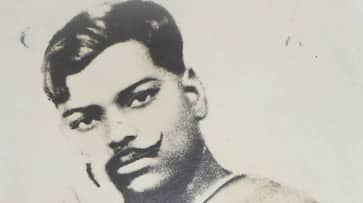Prime Minister Narendra Modi paid rich tributes to Chandra Shekhar Azad on his 112th birth anniversary. Modi remembered Azad's sacrifice and hailed him as 'a brave son of Bharat Mata'
Born on 23 July 1906 in Bhavra, Madhya Pradesh, Chandra Shekhar Azad was one of the brave sons of India. He dedicated his entire life to the freedom struggle and vowed that he would never be captured alive by the British.
On his 112th birth anniversary, Prime Minister Narendra Modi took to Twitter too pay rich tributes. He tweeted, “On his birth anniversary, my tributes to the great Chandra Shekhar Azad. A brave son of Bharat Mata, he sacrificed himself so that his fellow citizens get freedom from colonialism. Generations of Indians are inspired by his courage.”
On his birth anniversary, my tributes to the great Chandra Shekhar Azad. A brave son of Bharat Mata, he sacrificed himself so that his fellow citizens get freedom from colonialism. Generations of Indians are inspired by his courage.
— Narendra Modi (@narendramodi) July 23, 2018
On this occasion, here is a look at some of the remarkable moments from his extraordinary life
- The massacre at Jallianwala Bagh in 1919 affected young Chandra Shekhar so deeply that he decided to participate in the Non-Cooperation movement led by Mahatma Gandhi in 1920.
- He was only 15 years old when he was arrested for the first time for his involvement in freedom struggle. He was punished with 15 whiplashes.
- Legends say that on being produced before a judge, he gave his name as Azad, father's name as Swatantrata (independence) and residence as "Jail".
- He was the lead strategist of the Hindustan Socialist Republican Association (HSRA).
- Azad was part of Kakori Train Robbery of 1925 and the shooting of British police officer JP Saunders at Lahore in 1928.
- Chandra Shekhar Azad had vowed that he would never be captured alive by the British police and he kept that vow.
- Following the death of Lala Lajpat Rai, Bhagat Singh joined Azad to fight the British.
- Azad always believed that the money donated to their party by the people should only be used for the nation and not for any personal use.
- He was very particular about expenses and monitored every transaction.
- Alfred Park, where he became a martyr, was renamed as Chandra Shekhar Azad Park. On February 27, 1931, he was betrayed by his associates and ambushed by the police but he, upon knowing that he could not escape, killed himself. Thus, he died a free man.
Last Updated Jul 23, 2018, 5:59 PM IST









![Salman Khan sets stage on fire for Anant Ambani, Radhika Merchant pre-wedding festivities [WATCH] ATG](https://static-gi.asianetnews.com/images/01hr1hh8y86gvb4kbqgnyhc0w0/whatsapp-image-2024-03-03-at-12-24-37-pm_100x60xt.jpg)
![Pregnant Deepika Padukone dances with Ranveer Singh at Anant Ambani, Radhika Merchant pre-wedding bash [WATCH] ATG](https://static-gi.asianetnews.com/images/01hr1ffyd3nzqzgm6ba0k87vr8/whatsapp-image-2024-03-03-at-11-45-35-am_100x60xt.jpg)


